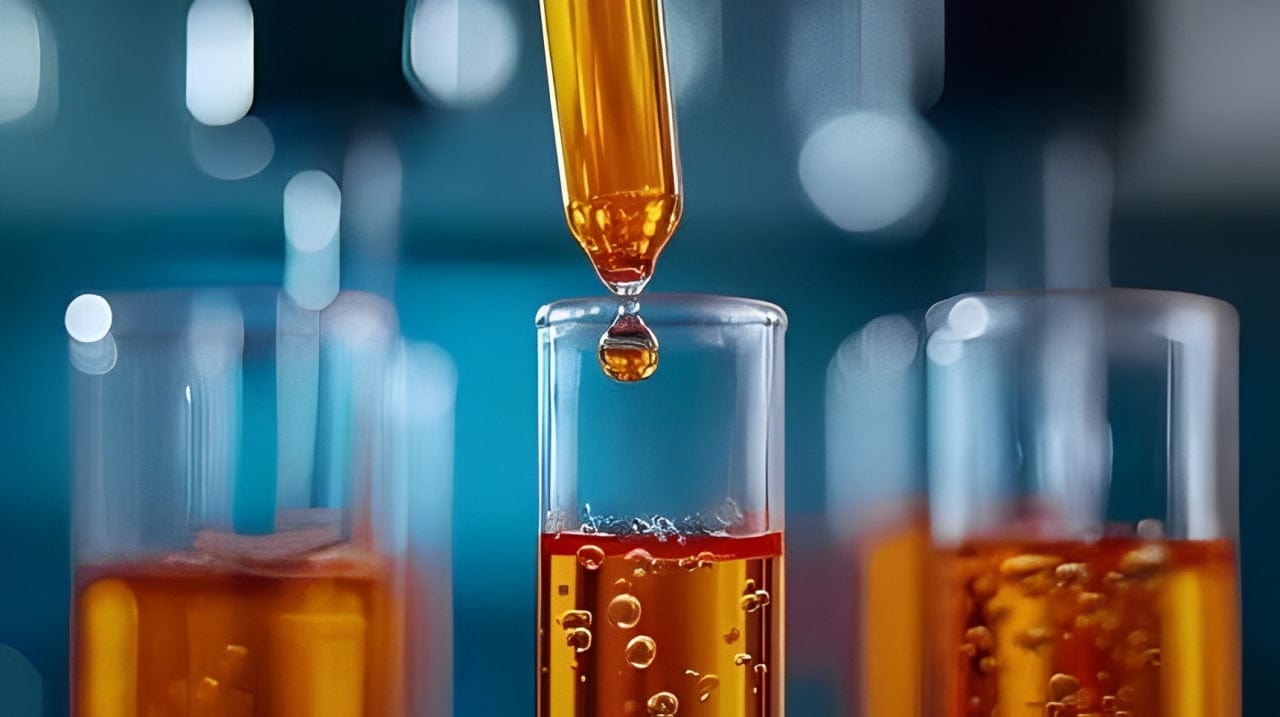Building a strong brand for your business doesn't happen by chance; it’s earned through trust, transparency, and a relentless commitment to integrity. Across the essential oil industry, no word is tossed around more casually or misused more frequently than “pure.” You’ll find it stamped on labels, echoed in ads, and promised by countless brands. But what does pure mean? And how can you, as a conscious consumer, know the difference between a marketing buzzword and true quality? As wellness rituals, skincare routines, and holistic therapies become increasingly integrated into our daily lives, the demand for genuinely clean and natural products has never been higher. People are looking for products that not only nourish the body and mind but also respect nature and uphold transparency.
At Hysses, purity isn't just a label; it's a laboratory-confirmed standard backed by science. Every essential oil we bottle is GC-MS tested, meaning it has undergone rigorous testing to verify its authenticity, potency, and safety. We don’t ask you to take our word for it; we offer proof in every drop. This is because to us, true purity is more than a promise. It begins with how the plant is harvested, and it ends with the scientific precision of GC-MS testing. In this guide, we’ll explore what GC-MS truly means, why it matters for your skin, wellness, and safety, and how Hysses ensures every drop of oil is as pure as nature intended. You’ll gain the confidence to choose oils not based on marketing claims, but on proven quality you can trust.
Understanding GC-MS: The Science That Proves Purity
To properly comprehend what makes an essential oil pure, we must look past the attractive packaging and smart wording. That's where GC-MS testing comes in, a scientific method that provides irrefutable verification of what's really inside each drop. The acronym GC-MS stands for Gas Chromatography-Mass Spectrometry. While the word seems complicated, the concept is simple: it is a method of breaking down and studying an essential oil to determine exactly what it contains.
Let’s simplify it:
-
Gas Chromatography is the first part of the test. It works by heating the essential oil to separate it into its chemical components, almost like untangling all the threads in a piece of fabric.
-
Then comes Mass Spectrometry, which takes those individual components and identifies each one by its molecular structure. It specifies the ingredients and their proportions.
Together, these two steps create a detailed “fingerprint” of the oil’s composition. This testing is crucial because not all oils on the market are as pure as they claim. GC-MS reveals what the naked eye or even smell can’t detect. It can uncover:
-
Synthetic additives that mimic scent but offer no real therapeutic benefit.
-
Adulterants and dilutions, like carrier oils or fillers used to stretch the product and reduce the cost.
-
Pesticide residues or chemical contaminants may be left behind from poor farming practices.
Without GC-MS testing, there’s simply no way to be sure the oil is truly natural, unadulterated, and safe for your skin, body, or senses. That’s why at Hysses, GC-MS isn’t optional, it’s essential. We test every batch of our essential oils using this gold-standard method to ensure that what you get is exactly what nature intended. No fillers. No fakes. Just proof-backed purity.
And here’s something many people don’t know: not all essential oil brands perform GC-MS testing. Some rely on internal checks or vague quality claims, while others skip testing altogether. At Hysses, we believe you deserve more than just promises; you deserve proof.
Why It Matters to You: The Risks of Non-Tested Oils
When it comes to essential oils, purity is not a luxury; it is a requirement. If an oil has not been GC-MS tested, it is impossible to know what is inside. Unfortunately, not knowing something can injure you. Many essential oils on the market may appear and smell pleasant, but they may contain synthetic additives, cheap fillers, or chemical residues that are harmful to your health and skin.
Let’s look at what can go wrong with non-tested oils:
1. Skin Irritation and Allergic Reactions
Essential oils are powerful plant extracts. When they’re pure and used correctly, they can support skin health, relaxation, and overall wellness. But when adulterated with unknown chemicals or diluted with low-grade carriers, they can cause:
-
Redness or burning
-
Rashes or breakouts
-
Worsening of sensitive skin conditions
Without GC-MS testing, there’s no way to tell if an oil is truly safe for topical use.
2. Misleading Therapeutic Benefits
Many people use essential oils for wellness, whether to sleep better, ease tension, or improve mood. But these benefits come only from genuine, natural compounds found in the plant itself.
When oils are altered or diluted:
-
The key active components are reduced or missing altogether.
-
The aroma may be similar, but the effects are weak or nonexistent.
-
The experience becomes more about scent than true healing.
If an oil isn't GC-MS-tested, there's no guarantee you're getting the full therapeutic value.
3. Exposure to Harmful Chemicals
Some oils are extracted from plants grown with pesticides or synthetic fertilizers, and when not properly tested, those toxins can remain in the final product. Others may be mixed with chemical solvents to mimic scent or increase volume. Over time, repeated exposure to these hidden toxins can affect your body than you realize, especially when diffused or applied directly to your skin.
Quick Fact: The Reality of Adulterated Oils
According to industry studies, more than 70% of essential oils on the market are adulterated in some form, either diluted, synthetically altered, or mislabeled. Many brands don’t test their products at all, and even fewer make those test results available to consumers. This makes it incredibly difficult for everyday users to separate real purity from clever marketing.
Where Hysses Stands
At Hysses, we don't believe in cutting corners or making ambiguous statements. Every essential oil we sell is GC-MS tested, so you'll never have to wonder what you're putting on your skin or breathing into your lungs. You deserve more than simply a lovely fragrance. You deserve purity, safety, and proof that has been carefully bottled, precisely tested, and is backed up by transparency. Choosing Hysses means getting essential oils that are as honest and clean as the plants they originated from.
Verified GC-MS Reports for Our Essential Oils
At Hysses, we believe in full transparency when it comes to the quality of our essential oils. That’s why every batch we produce undergoes GC-MS (Gas Chromatography–Mass Spectrometry) testing, a trusted scientific method that verifies the purity and authenticity of each oil. These tests identify the exact chemical composition, ensuring our oils are free from synthetic additives, fillers, or harmful contaminants.
Below, you’ll find downloadable GC-MS reports for a selection of our essential oils, including lavender, peppermint, frankincense, and more. Each report is clearly labeled, so you see exactly what’s inside your bottle. Whether you're an aromatherapy enthusiast or a conscious shopper, these reports offer the peace of mind that every drop of Hysses oil is tested, verified, and genuinely pure.
GC-MS Report – Lavender Oil
Lavender essential oil is prized for its delicate, flowery perfume and relaxing charm. It is one of the most versatile oils in aromatherapy, being used frequently in relaxation routines, sleep mixes, and skin-soothing compositions. Lavender is a gentle yet efficient herb that promotes emotional balance, tension relief, and a sense of tranquility in both the mind and body.
GC-MS Report – Hinoki Oil
Hinoki essential oil, derived from the Japanese cypress tree, carries a clean, woody aroma with subtle citrus undertones. Traditionally used in spiritual practices and bath rituals, it promotes a grounded, tranquil atmosphere and is often favored for meditation, relaxation, and emotional clarity.
GC-MS Report – Grapefruit Oil
Grapefruit essential oil offers a bright, citrusy scent that feels fresh and uplifting. Known for its energizing and mood-boosting properties, it’s commonly used to refresh indoor spaces, support focus, and add a vibrant top note to natural fragrance blends.
GC-MS Report – Clary Sage Oil
Clary sage essential oil features a herbaceous, slightly sweet scent with calming, hormone-balancing qualities. Often used in wellness routines for emotional support and tension relief, it’s especially loved in blends for stress, menstrual comfort, and relaxation.
GC-MS Report – Frankincense Oil
Frankincense essential oil is deeply resinous and earthy, long treasured in spiritual and healing traditions. Valued for its grounding aroma, it is often used in meditation, skincare rituals, and restorative aromatherapy blends to support peace, clarity, and inner stillness.
GC-MS Report – Peppermint Oil
Peppermint essential oil delivers a sharp, minty aroma with an instantly refreshing effect. Popular for its cooling sensation and invigorating scent, it’s widely used to promote alertness, ease physical discomfort, and bring clarity to both mind and breath.
GC-MS Report – Tea Tree Oil
Tea tree essential oil is known for its sharp, medicinal fragrance and potent cleansing qualities. It is frequently used in natural cosmetics and home remedies to maintain clear skin, promote cleanliness, and is praised for its refreshing, clarifying properties.
GC-MS Report – Chamomile Oil
Chamomile essential oil carries a soft, sweet, and slightly herbaceous scent, beloved for its calming and comforting nature. Often used in bedtime blends and skin-soothing products, it supports emotional balance, relaxation, and gentle care for sensitive skin.
GC-MS Report – Palmarosa Oil
Palmarosa essential oil has a fresh, floral aroma with a hint of rose. It is often used in skincare routines for its hydrating qualities and is appreciated in aromatherapy for its uplifting, heart-opening energy that helps relieve stress and emotional fatigue.
GC-MS Report – Mandarin Oil
Mandarin essential oil offers a light, sweet citrus scent that feels cheerful and gentle. Its soft aroma makes it ideal for calming anxious feelings, creating a serene space, and adding a playful brightness to blends for both children and adults.
GC-MS Report – Lemon Oil
Lemon essential oil is vibrant, zesty, and unmistakably fresh. Known for its cleansing and energizing qualities, it’s often used to purify the air, uplift the mood, and bring a burst of natural clarity to mind, body, and environment.
GC-MS Report - Marjoram Oil
Marjoram essential oil is warm and soothing. Known for its comforting and grounding qualities, it’s often used to ease tension, promote relaxation, and create a sense of calm in both mind and body. Its gentle aroma makes it a favorite for winding down after a busy day and fostering peaceful rest.

GC-MS Report – Orange oil
Orange essential oil is bright, sweet, and sunny, radiating a joyful warmth that feels both uplifting and comforting. Known for its mood-boosting and revitalizing qualities, it helps create an atmosphere of positivity while gently soothing stress. Orange blends beautifully with lemon’s crisp clarity and mandarin’s soft sweetness, creating a balanced, mood-boosting citrus trio.

GC-MS Report – Eucalyptus oil
Eucalyptus essential oil is crisp, invigorating, and refreshingly cool — a breath of pure, energizing air. Known for its clarifying and revitalizing qualities, it helps clear the mind, support easy breathing, and create a feeling of openness in both body and space.

GC-MS Report – Grapefruit oil
Grapefruit essential oil is bright, crisp, and refreshingly sweet. Known for its uplifting and cleansing qualities, it energizes the mind, lifts the mood, and adds a sparkling freshness to any blend.

GC-MS Report – Geranium oil
Geranium essential oil is floral, fresh, and softly sweet, known for its balancing and uplifting qualities. Known for its harmonizing qualities, it’s often used to restore emotional balance, refresh the senses, and create a welcoming, heartwarming atmosphere.

GC-MS Report – Rosemary oil
Rosemary essential oil is crisp, invigorating, and powerfully aromatic, with a fresh herbal scent that awakens the senses. Known for its stimulating and clarifying qualities, it’s often used to sharpen focus, refresh the mind, and promote a sense of clear, energized vitality in both body and environment.

Hysses Philosophy: Science + Sustainability + Soul
At Hysses, GC-MS testing is not just a quality control step; it’s part of a deeper promise. We believe purity begins with intention, not just analysis. That’s why we go beyond the lab to honor the land, the plant, and the people behind every oil we produce. We work closely with indigenous communities and local growers, respecting their deep-rooted knowledge and traditional harvesting methods. These partnerships ensure that the plants are not only harvested at their peak but also in ways that are sustainable and kind to the environment.
Each bottle of Hysses oil tells a story not just of scientific integrity, but of the soil it grew in, the hands that gathered it, and the care that carried it through every step. This balance of science, sustainability, and soul is what makes our oils truly authentic and what sets Hysses apart in a crowded world of claims.
Final Thoughts
Behind every true essential oil lies a deeper story, one of honesty, care, and uncompromising purity. True purity comes from responsible sourcing, ethical harvesting, and scientific testing that leaves no room for guesswork.
At Hysses, we use GC-MS certification not as a selling point, but as proof of our commitment to clean, authentic, and safe oils. It's how we turn our promise into something you can trust and feel.
In a market filled with empty claims and pretty packaging, we invite you to look deeper. Ask questions. Read reports. Choose transparency.
Explore Hysses’ GC-MS-tested collection today and experience what real purity feels like, from plant to bottle.
Frequently Asked Questions
1. What is GC-MS in essential oils?
GC-MS, or Gas Chromatography-Mass Spectrometry, is a scientific testing method used to analyze the components of essential oils. It breaks the oil down into its chemical compounds, identifying what’s in it and how much of each compound is present. This process helps confirm the oil’s purity, safety, and authenticity.
2. How can you tell if an essential oil is 100% pure?
The most reliable method is through GC-MS testing. A GC-MS report reveals the oil's exact chemical composition, enabling you to determine whether it contains only natural substances or has been adulterated with synthetic chemicals or fillers. Look for brands that, like Hysses, make these reports easily available and transparent.
3. What’s the difference between essential oil and aromatherapy oil?
Essential oils are highly concentrated plant extracts obtained through distillation or cold pressing, and they contain no added ingredients.
Aromatherapy oils, on the other hand, may be a blend of essential oils mixed with carrier oils or synthetic fragrances. They’re often used for scent purposes but may not offer the full therapeutic benefits of pure essential oils.
4. What are the advantages of GC-MS?
GC-MS testing offers several key benefits:
-
Confirms oil purity and authenticity
-
Detects adulteration or contamination
-
Identifies harmful substances like pesticides or synthetic chemicals
-
Ensures consistent quality for therapeutic use
It’s considered the gold standard in essential oil quality testing.
5. How expensive is GC-MS?
GC-MS machines are highly advanced and can cost anywhere from $50,000 to over $150,000, depending on features and capabilities. The process also requires skilled technicians, which adds to the operational cost. This is why not all brands invest in GC-MS testing, but at Hysses, we believe it’s worth it.
6. What is GC-MS used for?
GC-MS is used in various industries to:
-
Test the purity of essential oils
-
Identify unknown substances
-
Analyze flavors, fragrances, and food additives
-
Detect pesticides, toxins, or contaminants in chemical and environmental studies
In the context of essential oils, it's used to guarantee that what is in the bottle matches what’s promised on the label.
7. How much does a GC-MS test cost?
A single GC-MS test can cost anywhere from $100 to $500 per sample, depending on the laboratory and the complexity of the oil. This investment helps ensure quality, safety, and transparency for the end user.














Share:
D.I.Y Insecticide with Tea Tree Oil
Enhance Immunity with The King of Essential Oils